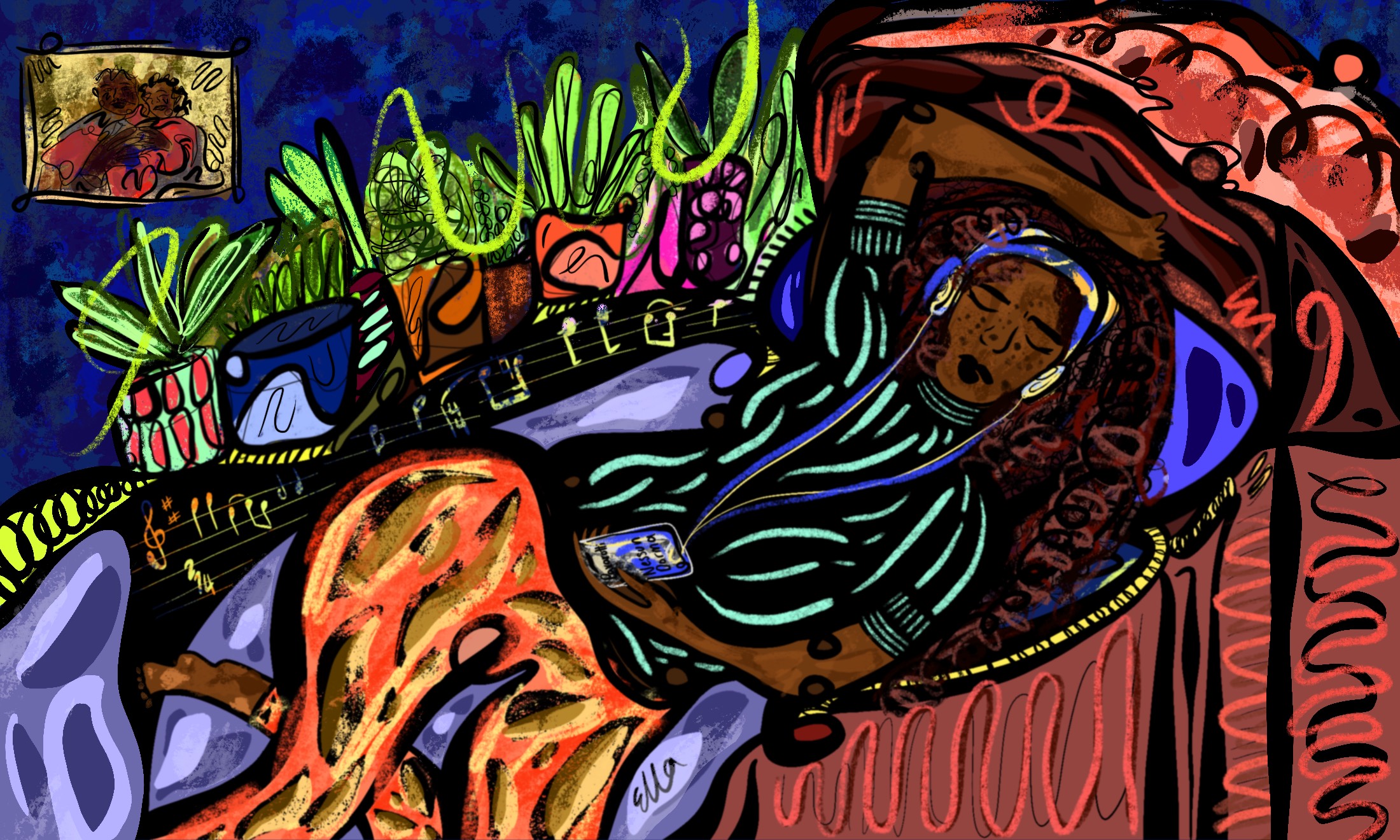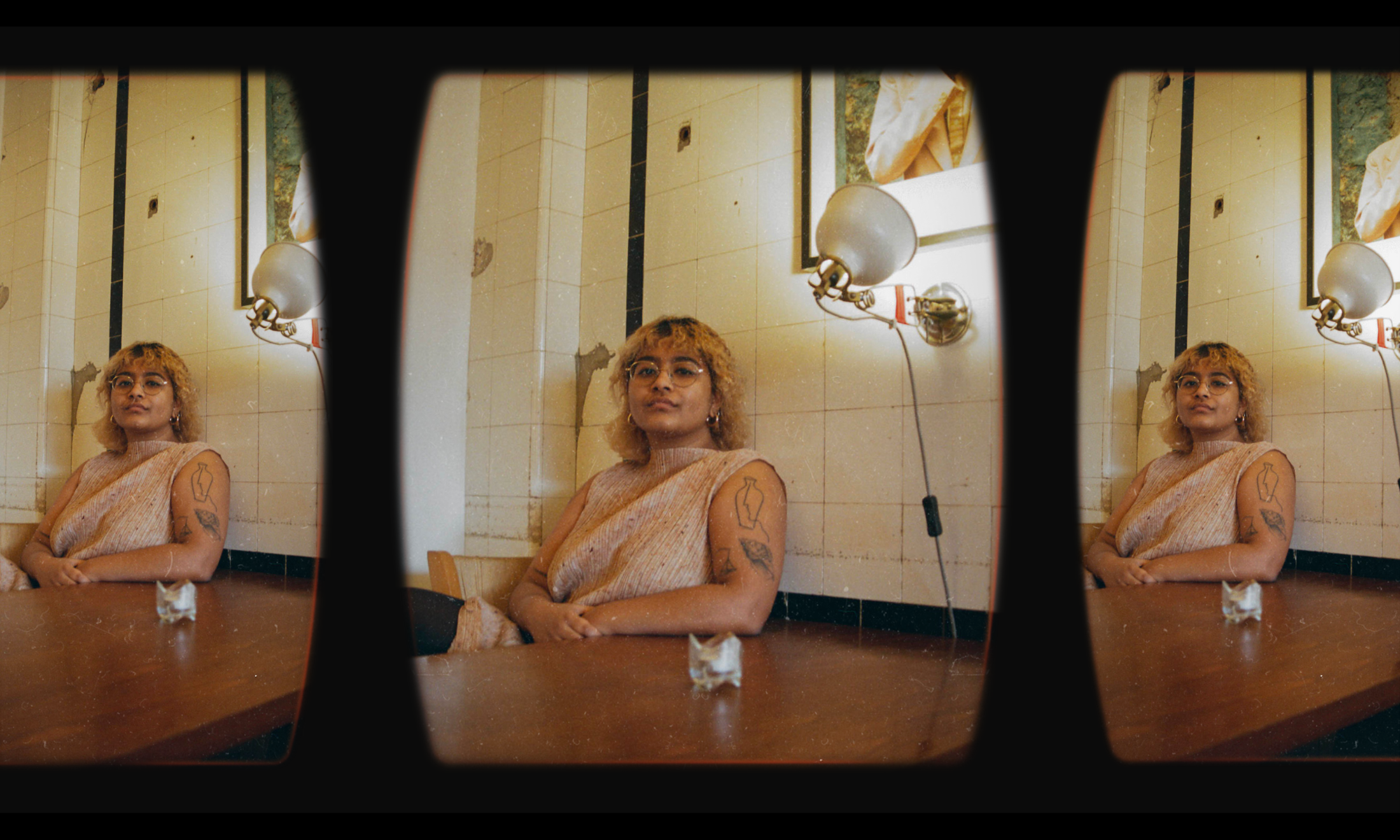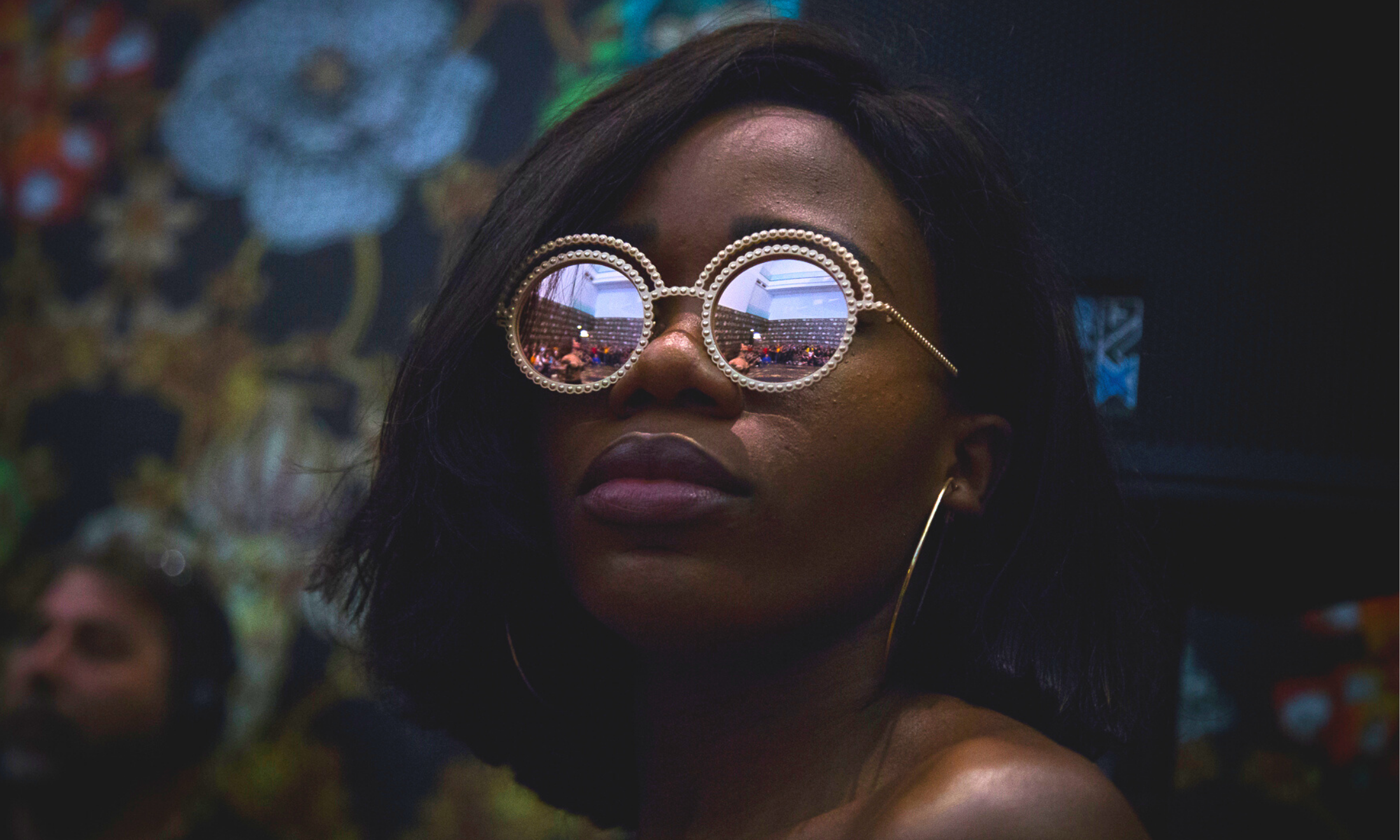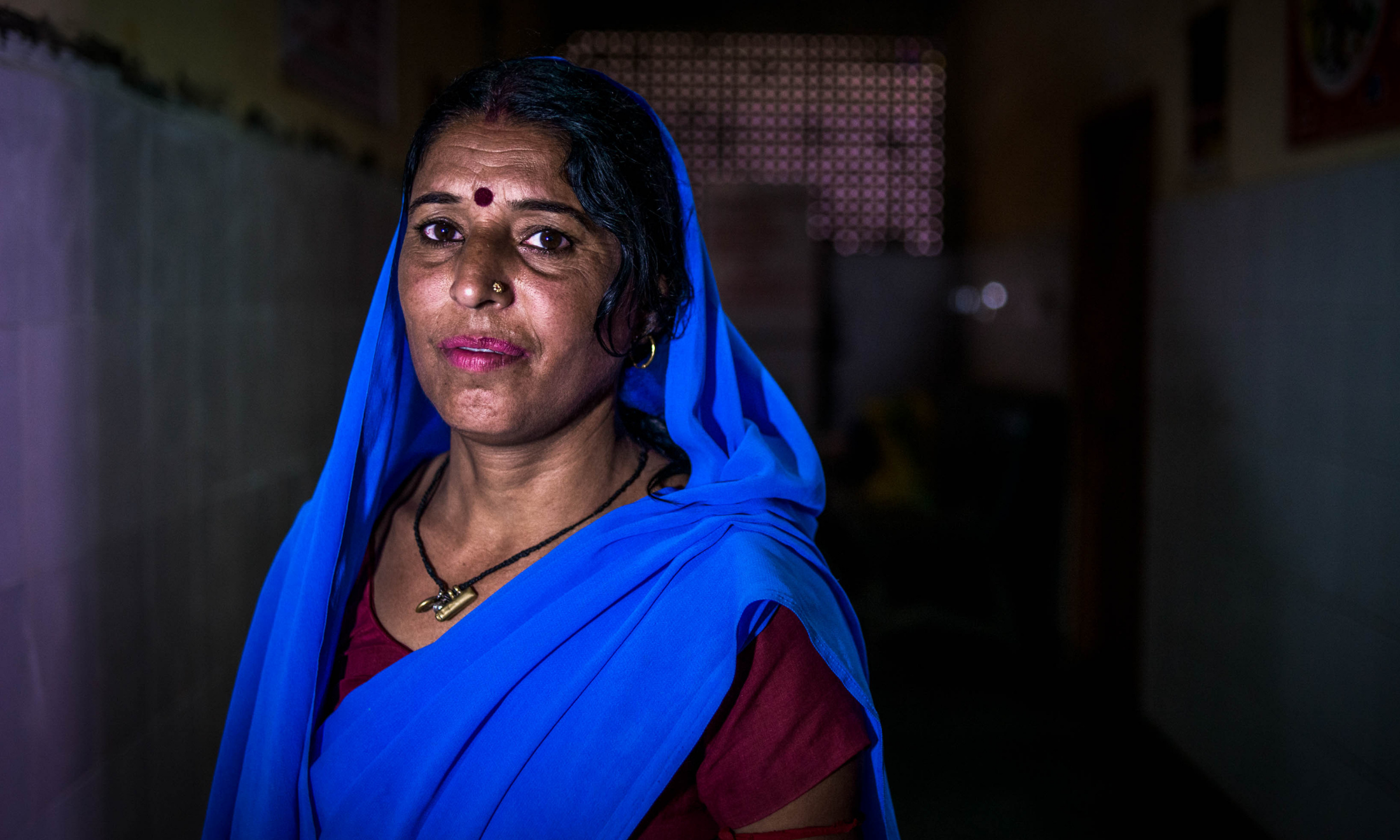Opera helped me process my father’s death during the pandemic
After her father passed away from Covid-19, Ella Alalade found herself turning somewhere unexpected to deal with her grief.
Ella Alalade
25 Mar 2021

Illustration by Ella Devi Dabysing
Opera always felt like an extravagant genre to me. I was captivated by it, but never had the motivation or energy to listen to such long ballads about emotional stories and pain. My father had been a big fan of opera, but he had also been absent a lot throughout my childhood – hearing it when I was growing up reminded me too much of his absence. I saw old opera cassette tapes in my house and disregarded them – it was too distant for me to comprehend.
On April 7 2020, my dad died from Covid-19 complications. My soul felt disgruntled, rather than sorrowful. Unable to cry, I felt isolated in a room of grieving family who I could not share the same emotions with. It was a moment that felt so reductive, the numbness felt invisible. It was unbearable to think about his absences now, and it was another layer of depression that clouded me all the way to the funeral. We never got to say goodbye. As I saw his casket lowered into the ground, it occurred to me how death is weird. Covid-19 is not only a barrier for comfort but also grief.
“Opera had never been as poignant to my soul as it was in this moment”
I was unable to distract myself with my normal activities like going to the V&A museum to look at my favourite sculptures and fine art, or watching a film at the cinema and eating brunch with friends to find some comfort. Instead, I grieved in the solitude of my room. Binge-watching random shows like The Sopranos felt an easier coziness to embrace than my usual activities of reading novels or history.
A week after the funeral, with no tears but anger, I was on the hunt for soothing music to diverge from the anxiety and insomnia. One late night on my phone, I opened Spotify looking for classical music to get me to sleep. There I found a tenor voice singing a great ballad – it was Turandot’s ‘Nessun dorma!’, performed by Luciano Pavarotti, one of the world’s most famous opera singers. Immediately, it reminded me of my dad’s old music.
Previously, I could hear how opera singers’ voices might be angelic or joyous, but none of it had really resonated. None of it had ever been as poignant to my soul as it was in this moment.
It was like hearing earth’s final act before crashing into heaven. It was a declaration of love and anguish which spoke to an estranged child. A cry of emotion gasped out of my mouth as I heard the last note. The overwhelming sensation captivated my heart. I felt closer to understanding my father’s enjoyment of opera and, in turn, my father.
Listening to Pavarotti has become a melodramatic form of healing and confronting my grief. Songs like ‘L’elsir d’amore’ and ‘O soave fanciulla’ express and convey memories of joy, making me nostalgic for walking in the beautiful summer hills of Sorrento with my friends one year in early June, or being introduced to my favourite Italian dish – seafood risotto – with my mum and brother at a local restaurant back on an old holiday to Rome. Listening to opera has also unlocked a memory of first visiting Melbourne with my dad, going to the zoo and seeing koala bears for the first time as a five-year old.
“Listening to Pavarotti has become a melodramatic form of healing and confronting my grief”
My father adored classical music for its affirming stories of love, joy and passion – the same passion which had fuelled him to celebrate culture. But opera told stories of struggle, too, and that was a part of him. I watched a documentary, Pavarotti: Birth of a Pop Star, and learned that Pavarotti believed in making opera a form of social conquest by taking it into the street. His desire to be a ‘man of the people’ reminds me of my father’s desire to be heard. His ambitions were like Pavarotti, in attempting to make art accessible for the working class and uplifting communities into obscure interests. My dad would make a friend on the street and remember their face for years. His own character was as inviting as Pavarotti’s claimed to be.
My dad wanted me to become a cultural curator of art and history, and he showed me these songs as part of that journey. Rediscovering Pavarotti has inspired me, opening a door for me to search for more opera singers.
As a black woman, I sought black women in the opera scene. I found Jessye Norman, who conveys such beauty in her ballads. I remembered my father had been a fan. Jessye’s voice brought me peace, reminding me of contentment in normal times. Her version of ‘Dido’s Lament’, an ode to remembrance and endearment, radiated grace and tranquillity. Jessye’s voice illustrated true elegance which helped me understand why my father admired her so much.
Damie Oladebo, an opera fan and health policy lawyer, tells me, “Opera transcends a lot of [the] experience of being a black woman” and exists in a universe separate from hers. She believes that opera and classical music are underappreciated art forms that go beyond describing emotions and feelings. This passion for opera is heightened when I feel ostracised as a black creative, unable to have my stories be seen in the narrative.
Since I stumbled across opera, I have also re-examined my interest in music more broadly. Classical scores have been bringing back childhood memories of being in the choir, from 12 to 14, where I sang to escape loneliness. In the present day, classical music has brought an additional focus to my grief and awareness of myself. I’ve finally been able to enjoy my love of looking at fine art and reading fiction again. Rediscovering this music has been cathartic.
“Maybe classical music is the soundtrack to our collective grief. But for me, opera has been a private art to guide my emotions through, channelling my grief into ballads”
I have not been alone in this. According to RPO, 35% of people under 35 have found classical music has brought a sense of peace and calm during the pandemic. I believe opera and classical music exudes certain emotions that other genres may not. Moments of stillness, confusion and anxiety are satisfied by classical and operatic scores; by its harmonious notes. Maybe classical music is the soundtrack to our collective grief.
But for me, opera has been a private art to guide my emotions through, channelling my grief into ballads which exude great passion. Passions of sorrow, empowerment and peace intertwined with memories of my father. Pavarotti was a force who provided me with a space to grieve for my dad, transporting me to a better understanding of my father’s character, and his desires to curate culture. His death from Covid-19 was a life stolen and neglected, but opera helped fill the void of my conflicted emotions.
Although opera is arguably an acquired taste, it has offered a narrative for me to approach these very human dilemmas in this tumultuous time. The everlasting insomnia has remained to plague my mind with memories of how I never saw my father to say our farewells to each other. Ballads like ‘Dido’s Lament’ mirror classical tragedies, and possess the ability to deliver a farewell message in moments of anguish. In that way, at least, opera has allowed me a goodbye.









